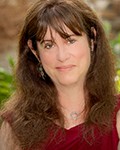“Being an older sister was a very central role for me when I was a kid,” Joy Preble says. “We were children of older parents.” Which translated to benign permissiveness in comparison to today’s world of helicopter parents. Preble and her brother would leave their Chicago house mid-morning and return late in the afternoon. Often, they took in a Cubs game arriving when the gates opened to watch field cleaning and batting practice. They’d hang over the fence and chat with players. Throughout it all, Preble knew she was responsible for her brother’s welfare, a responsibility she took very seriously. “This sibling relationship is such a strong relationship, yet it’s not one you choose. It’s just one you’re given,” she says. Most of her books for young readers explore this bond. For instance, in Sweet Dead Life and The A-Word, Preble’s novels that appeal to both middle-grade and young adult audiences, siblings Jenna and Casey care for each other even after one of them dies.
“I’ve been a writer and a reader as long as I can remember,” Preble says. In addition to teaching high school English, she wrote nonfiction articles, personal narratives and essays for such publications as English Journal and the Houston Chronicle. Her journalistic work helped her realize that she could indeed be a published author, and during this time she started novels without finishing them.
About ten years ago, Preble began to attend a creative writing group that met at Barnes and Noble on Monday nights. She listened to fellow group members read from their manuscripts and jotted down craft tips. Although she never shared her own work, the group encouraged her to look inward and find her voice. “What I liked to watch on television, what I liked to read often had younger characters,” Preble says. “I realized that the reason I wasn’t finishing my ‘grown-up’ novels was because I wasn’t supposed to be writing them.” She needed to be writing stories about growing up—“that period of time in later adolescence where everything is so heightened and intense. It’s the coming of age, it’s the first kiss, it’s getting your driver’s license.”
Preble’s characters are born from observations of people. “I’m quiet by nature, so I listen. People say and do the strangest and most wonderful and sometimes the most awful things. I’m shocked that it doesn’t inspire everybody in one way or another.”
Add to Preble’s people-watching a love of genre fiction such as sci-fi or fantasy, and a bit of trash TV and you have a crazy mix of interests. For instance, she says, “I’ve been fascinated with the Romanovs since I was in seventh grade. I read Nicholas and Alexandraand the Romanov tragedy stuck with me.” She also wrote Star Trek fan fiction as a kid and gave Mr. Spock a love life long before Hollywood set him up with Uhura. Preble wrote her stories on yellow legal pads and exchanged them with friends. As an adult, Preble became obsessed with Buffy the Vampire Slayer’s unusual melding of genres. Remembering her own fascination with the Romanovs and sci-fi, she decided to experiment with her own writing. Dreaming Anastasia–the result of melding Baba Yaga fairy tales, fantasy, and the Russian Grand Duchess Anastasia—was ahead of its time.
Sometimes the germ of an idea comes from the minutia of everyday life. While on a road trip from Houston to Dallas, Preble and her husband stopped at a roadside restaurant. At the time, Preble was struggling with a romantic comedy novel that wasn’t working. “I wasn’t writing the book I was supposed to be writing,” she says. Preble visited the restaurant’s ladies’ room and the walls were festooned with the usual graffiti messages promising a good time or salvation. In this unlikely place, an idea came to Preble. “What if there were these two sisters who were on a road trip…The older one went into the bathroom and didn’t come out, and left a graffitied message for the younger one to find and sent her on a scavenger hunt.” Preble calls her upcoming novel Finding Paris and describes it as “a creepy, angrier Thirteen Little Blue Envelopes…a sibling story about a missing sister and a very dark secret.”
Although Preble currently writes fiction, she grew up reading big, unwieldy nonfiction books that made her feel grown-up. Her love of nonfiction carries over to her fiction as research. “Research makes me very happy,” she says. At the time of this interview, Preble was immersed in fountain of youth lore for It Wasn’t Always Like This, an upcoming 2016 release that Preble describes as Tuck Everlasting meets Veronica Mars or “a girl, a boy, a fountain of youth and what happens when you’re stuck at seventeen.”
Preble writes from an upstairs office in her Houston home usually six days per week. During the first draft stage she tries to adhere to a goal of 2,000 words per day. Sometimes she write with friends during what she calls a write-a-thon—a mini-retreat in which there is no conversation until the timer rings. “People have a romanticized idea of what [writing] is like,” she says. “In reality, it’s you in dirty yoga pants typing punctuated by a spoonful of Nutella.”


